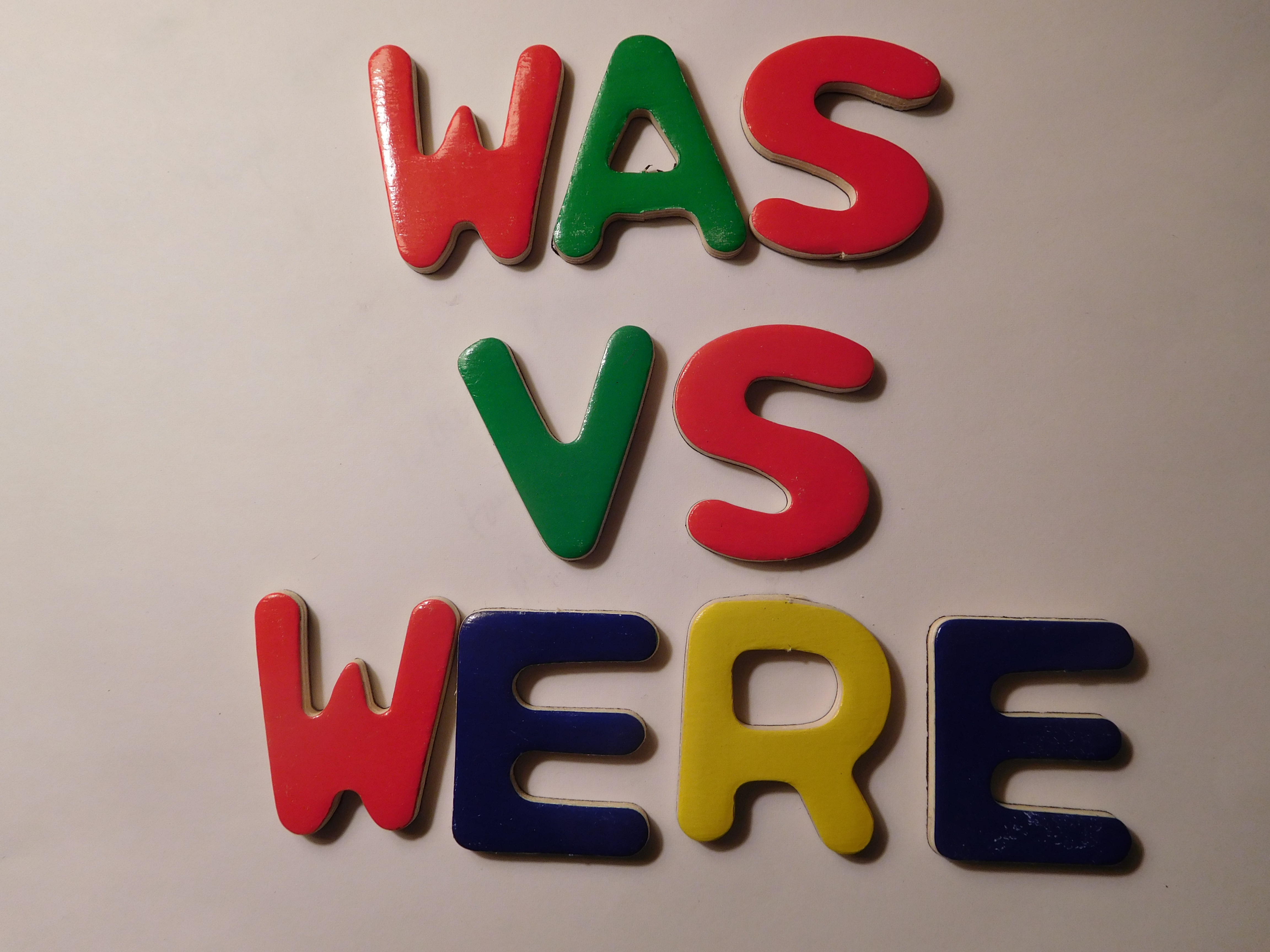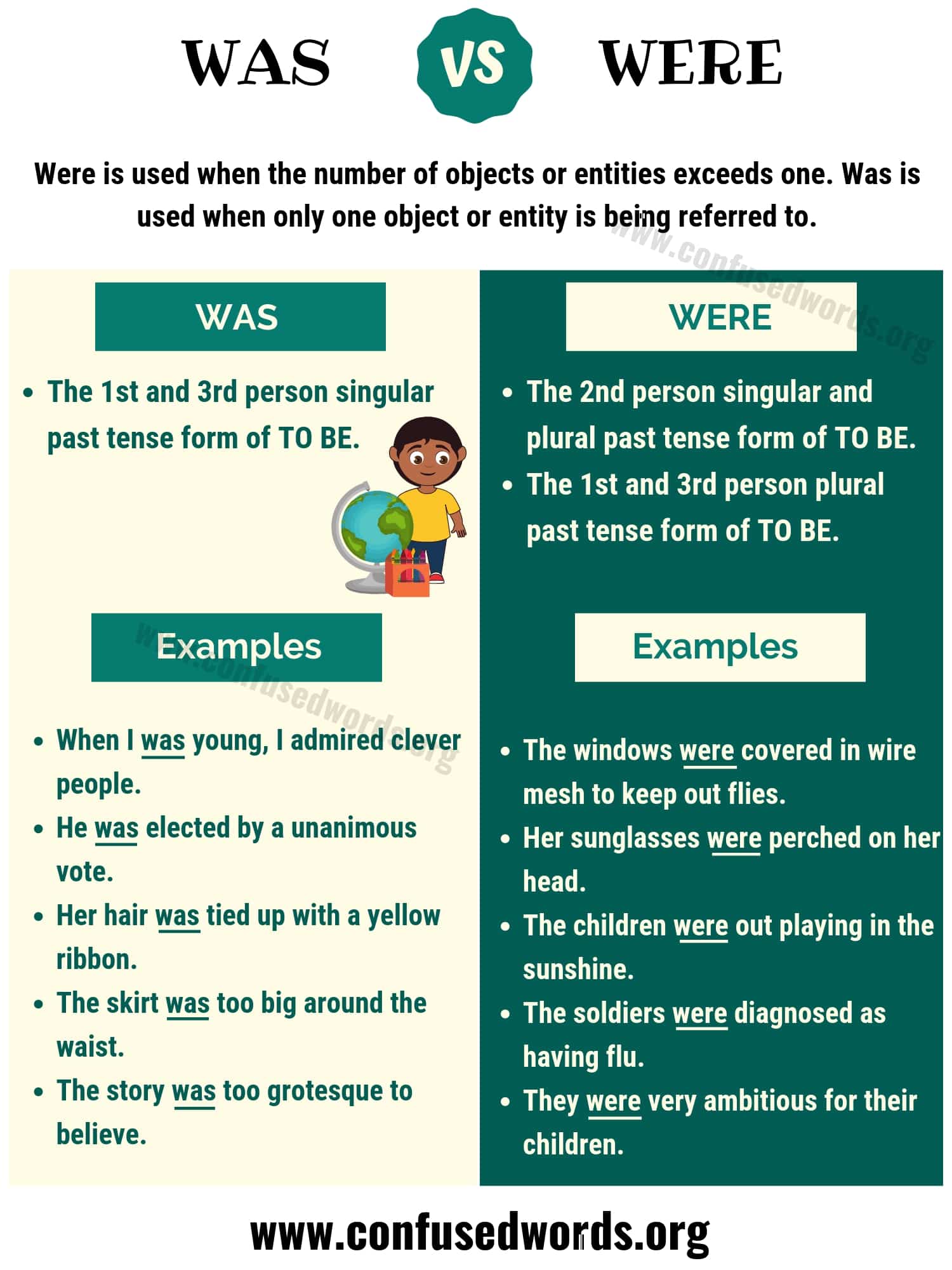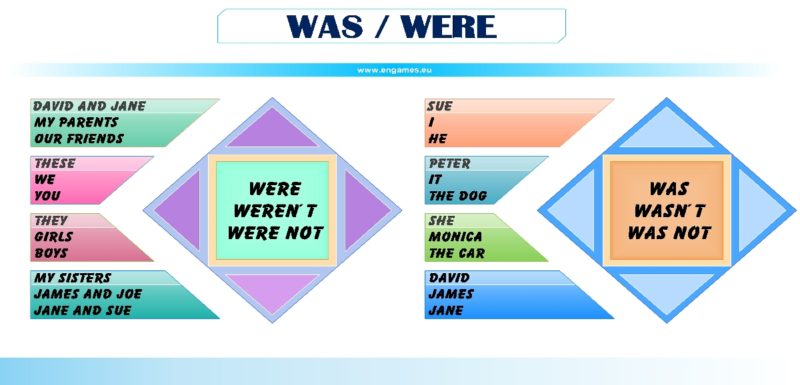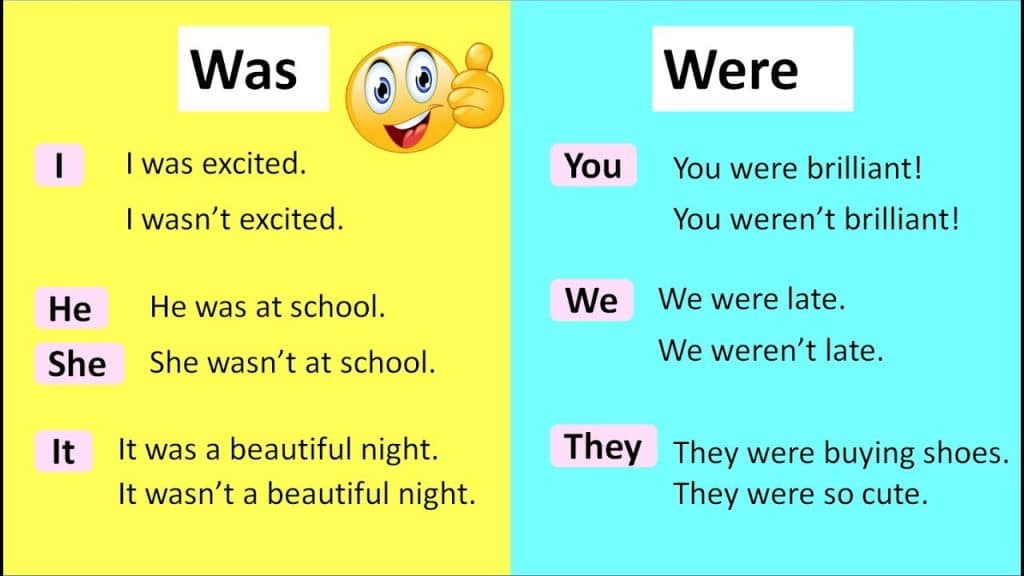Was were
erek erek musang barazia gjinore ne parahistori dhe sotHow to Use “Was” vs. “Were” Correctly | Grammarly. To better see what we are up against when deciding when to use was and when to use were, let’s compare the past tense and subjunctive mood conjugations of to beside by side. Our table reveals something delightful: Whether you’re trying to use the simple past or the subjunctive, you can’t go wrong when … See more. Was vs. Were - Usage, Examples and Worksheet. Learn the difference between was and were, two past tenses of the verb to be. Find out how to use them correctly in different …. Was vs. Were: What’s the Difference? - Writing Explained. Was and were are both past tenses of the verb to be, but they are used differently in sentences. Was is used for statements of fact, while were is used for unreal or …. "Was" vs. "Were": Use Cases And Examples. Learn how to use the past tense forms of to be correctly in different contexts and moods. Was is for real or known facts, were is for …. Was vs. Were - The Blue Book of Grammar and …. Learn the difference between was and were, two common past-tense forms of the verb "to be". Was is singular and often used with third-person subjects, while were is often …. When to use “was vs were”: What’s the difference? - The …. What is the difference between was vs were?. The words “was” and “were” are past tense forms of the verb “to be,” a word English speakers use more often than they realize.Whenever we use the terms …. Learn When To Use Was and Were - LanguageTool
осушитель воздуха مسلسلات هنديه لودي نت
. Choose the correct form of was/were to complete the sentences with the correct verb forms
أبعاد الأرض متساوية 26 év alattiak vasúti kedvezménye
. Were (Grammar Rules and …. Learn the difference between was and were, two forms of the irregular verb be. Was is used with first and third person singular, while were is used with second person singular and plural. See how to use …. Was/were – past simple of be - Test-English. Present: are = past: were. We use was / were to talk about the past. We often use past expressions of time: yesterday, last night, last week, two months ago, etc. She was in …. Past simple - verb to be - LearnEnglish Kids. Learn how to use was, were, werent and werent in the past simple of the verb to be. See examples, games and activities to practise this grammar topic. Find out the difference …. Basic English Grammar – WAS & WERE · engVid. Learn English for free with 2022 video lessons by experienced teacherscamiseta basica syngonium podophyllum
. Classes cover English grammar, vocabulary, pronunciation, IELTS, TOEFL, and moreเชื้อราในร่มผ้า modele pulovere tricotate manual copii
. Join millions of …. Was vs Were: What’s the Difference? - ProWritingAid. In general, we use were for the second person pronoun (you), the first person plural (we), and the third person plural (they). We use was for the first person …. "Where" vs. "Were" – Whats The Difference? | Dictionary.com. The word were is one of the past tense forms (along with was) of the irregular verb be. Were is used with all plural subjects as well as the pronouns you and they (regardless of whether they are being used as singular or plural). For example: The deer were in the yard this morning. They were good, but you were better!. Was/were – past simple of be - Test-English. Present: are = past: were. We use was / were to talk about the past. We often use past expressions of time: yesterday, last night, last week, two months ago, etc. She was in Stuttgart last summer. We were late to the …. หลักการใช้ Was Were ใช้ยังไง และ Wasnt Werent ใช้ยังไง ใน Past …. การใช้ was were ใน Past tense. Was were เป็น verb to be ในกริยาช่องที่ 2 ซึ่งมักถูกใช้ใน Past simple tense และ Past continuous เป็นส่วนใหญ่ครับ เราใช้ was กับประธานเอกพจน์ และ .. [영문법인강] was와 were의 차이점! 무엇일까? : 네이버 블로그. We were happy. They were running. We were singing. They were young. 부정으로 하면 . werent . were not으로 하면 부정을 강조, 글쓰기 등 공식적인 상황에 가끔씩 사용. 대개 werent로 하세요. 의문문으로 하면 . Were we
ursi de plus dopuna sa fiksnog telefona mts
. 지금까지 was와 were의 차이점을 알아보았습니다.. Was / Were – To Be in Past Tense | Woodward English. Was / Were Games. Try our interactive games to practice To Be in the past tense: Was and Were in Short Answers. To Be in the Past Tense (mixed). I hope this was useful for you. A chart showing how to use Was and Were (To Be in the past tense) in affirmative and negative sentences and questions. Also games to practice Was vs Were.. When to use “was vs were”: What’s the difference? - The Word …. What is the difference between was vs were?. The words “was” and “were” are past tense forms of the verb “to be,” a word English speakers use more often than they realize.Whenever we use the terms are, is, am, was, were, be being, or been–– we are using the verb ‘be’ (to be). The verb ‘to be’ contains several forms because it’s an …taraz bus kz alquila tu coche por dias
. หลักการใช้ Was / Were เป็น อยู่ คือ ในอดีต ภาษาอังกฤษ. ความหมาย ของ Was / Were. คำว่า was / were คือ ช่องที่ 2 ของ verb to be จะว่าไปแล้วก็คือการแปลงร่าครับ เนื่องจากว่ามันเป็นช่องที่ 2 ของ is / am / are ดังนั้น .. Was vs. Were: How to Use Were vs
az év tiktokkere uo ペット訓練
. “Was” or “Were” in the “If” Clause/Conditional | Grammarly. When using the verb be with an if clause in real conditional sentences (events that already happened or are likely to happen), use was and were normally. When using be with an if clause in unreal conditional sentences (hypothetical events that have not happened or are unlikely), always use were no matter what the subject is.. be동사의 현재형(am, is, are)과 과거형(was, were) : 네이버 블로그. 현재는 말 그대로 ‘지금’이라는 뜻이고 과거는 ‘지난 일’이라는 뜻이잖아요. be동사를 사용할 때 현재의 경우 am, is, are 중 한 가지를, 과거의 경우 was 혹은 were를 사용합니다. (과거) I was hungry. 나는 배가 고팠다. (현재) I am full now. 나는 지금 배가 부르다.. Was vs. Were: How to Use Were vs

удача (мультфильм) tadex
. I wasn’t hungry then. (ตอนนั้นฉันยังไม่หิว) ex. They weren’t teachers .
bruma lodge időskori szemölcs képek
. I was taking a walk around the neighborhood. It was a beautiful day. Were is used for second-person singular and all plural forms: You were late three days in a row. We were worried something was wrong.. في اللغة الإنجليزية was were قاعدة استخدام | englease*. أولاً: لماذا نستخدم was/ were؟. يتم استخدام was أي “كان، كنت” و were أي “كانوا، كنا” عندما نتكلم عن حدث مضى وانتهى. أحيانًا، يتم استخدام كل من was/ were كفعل مساعد. على سبيل المثال: .I was sleeping. أي كنت .. Was Were: правила використання, таблиці, приклади • …. Was vs Were. Перше, на що слід опиратися: підмет. Якщо він виражений іменником в однині (або займенниками I, she, he, it) — ставимо was. Якщо іменником виражений підмет у множині (або займенники you, we, they ..